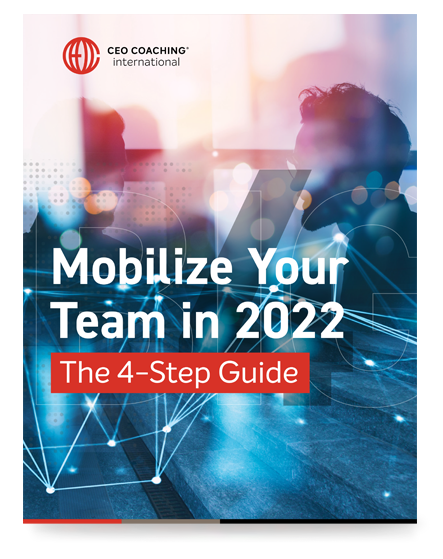According to the U.S. Bureau of Labor Statistics, 4.3 million Americans quit their jobs in August of 2021. That’s 2.9% of the country’s entire workforce.
And while much of the conversation surrounding The Great Resignation has been about people leaving unfulfilling jobs, CEOs need to start thinking about this trend a different way: folks are quitting unfulfilling companies.
At a firm with a powerful culture, every worker at every level of the organization feels like they’re making meaningful contributions to something BIG. Here are three ways that you can create that kind of inspiring and attractive culture and resignation-proof your company.

1. Offer more than money.
If you’ve driven past a strip mall or industrial park in the last six months, you’ve seen the signs: NOW HIRING! 90-DAY BONUS! BETTER-THAN MINIMUM WAGE! Higher up the corporate ladder, CEOs have, essentially, been waving the same signs at prospective managers and C-suite execs, just with more zeroes.
It’s not working.
Don’t get me wrong, money still matters. Top talent aren’t going to dig very far into your comp package if your salary or sales incentives aren’t competitive with what the best firms are offering. Likewise, flexible hours, remote work, and (depending on the size of your company) parental leave are all just table stakes now.
But in the current climate, employees want to work for companies that offer meaningful interactions, not just transactions. The very best workers know what their skills and experience are worth, and they know they can make comparable money anywhere.
So, what do employees at your company “earn” besides money?
Employee stock ownership plans (ESOP), phantom stock, and profit-sharing are becoming increasingly popular among top companies. On the surface, these kinds of arrangements might sound like just another way to pay people. But the sense of real ownership that these plans give to workers is more valuable than the points. You’re drawing a straight line between individual performance and the company’s growth trajectory. That’s empowering and meaningful to the right kind of worker and beneficial to the overall productivity of the company.
That connection between daily tasks and long-term goals becomes even stronger if your company has a mission beyond profit. During the pandemic, many businesses found ways to support their local communities that have grown into real, meaningful relationships. Other companies make sustained commitments to charitable giving or organize volunteer programs.
Much like profit-sharing, these initiatives make your employees feel like everything they do matters, and that there’s added value in doing their absolute best.
2. Never compromise on culture fit.
Nothing kills culture faster than hiring the wrong people. Negotiate all you want with prospective hires about salary, benefits, or how many days they can work from home. Culture fit is non-negotiable. CEOs have to separate talents who varnish their resumes by doing things their way from those who have a track record of making a positive impact on an entire organization with their passion, commitment, and buy-in.
Once you’re sitting face-to-face with the finalists for a top job in your organization, mix some of these questions into the conversation:
-
- What type of culture do you think is the best fit for you?
- What does your ideal workplace look like?
- What business values are important to you?
- What do you find attractive about our company?
- What’s your impression of our culture, and what do you like/dislike about it?
- What is it about you that you think you could bring to our company that would add to and complement our culture?
- Tell me about a prior work experience where you were not a strong cultural fit. Why was it a bad fit?
If you don’t like what you hear during this discussion, don’t let an impressive CV or winning personality change your mind. In my experience, culture incompatibility rarely works itself out, especially if you are hiring managers or executives who are more interested in their own goals than yours.
“Employees want to work for companies that offer meaningful interactions, not just transactions.”
– Mark Moses
Replacing a bad hire isn’t just expensive, it’s costly to the morale of your whole organization. While you’re up in the C-suite focusing on top-level tasks, it’s your midlevel staff who are dealing with a bad manager or picking up the slack for an ineffective coworker. You might not realize just how badly you’ve botched a hire until your most promising in-house talent are heading for the door.
3. Get clear on values.
In our new book, Making BIG Happen, CEO Coaching International’s Don Schiavone describes how core values can pull an organization together and become a catalyst for growth.
Before joining our team, Don was the Chief Operating Officer at Grasshopper. “From the very beginning, we actively nurtured a high-growth culture, but neglected to define our core values,” Don says. “We reached a point where we no longer liked the culture that evolved because we focused on growth at the expense of shared values.”
So, the Grasshopper leadership team brainstormed how they could create a culture by design, not by default. They also asked employees for their input on what they thought the company’s values were. Everyone contributed to a company wiki where they could share stories of their coworkers putting those values into action, complete with prizes for nominated team members.
Three months later, Grasshopper had collected hundreds of stories demonstrating the company’s culture. Don and the rest of the executive team identified four cultural values that united those stories and would lead to growth: going above and beyond, being entrepreneurial, demonstrating radical passion, and working collaboratively with teammates.
With these four core values identified, Don and his team were able to intentionally create a culture of growth that became a competitive advantage. That effort paid off when Grasshopper was able to 10x its profits and was ultimately sold to Citrix for a whopping $176 million in 2015.
Before the pandemic and the Great Resignation, many CEOs equated strong culture with a food court, ping-pong tables, and napping pods. Others tossed around arbitrary buzzwords rather than intentionally creating a culture that their teams could align with. Today, it’s the workers who have drawn a line in the sand between trivial niceties and real culture. It’s imperative that your company lands on the right side of that line if you want to attract and retain top talent and keep Making BIG Happen.
For more on how our proven best practices can transform your company’s culture, and to download our Core Values Builder and Culture Survey tools, click here to preorder Making BIG Happen.
Related – Free E-Book
“Mobilize Your Team in 2022: The 4-Step Guide,” is a captain’s guide for CEOs to lead the company ship from charting the course to mobilizing your crew and making tough calls through choppy seas to reach the shores of extraordinary success.

About CEO Coaching International
CEO Coaching International works with CEOs and their leadership teams to achieve extraordinary results quarter after quarter, year after year. Known globally for its success in coaching growth-focused entrepreneurs to meaningful exits, CEO Coaching International has coached more than 1,000 CEOs and entrepreneurs in more than 60 countries and 45 industries. The coaches at CEO Coaching International are former CEOs, presidents, or executives who have made BIG happen. The firm’s coaches have led double-digit sales and profit growth in businesses ranging in size from startups to over $10 billion, and many are founders that have led their companies through successful eight, nine, and ten-figure exits. Companies working with CEO Coaching International for two years or more have experienced an average revenue CAGR of 31% (2.6X the U.S. average) and an average EBITDA CAGR of 52.3% (more than 5X the U.S. average).
Learn more about executive coaching | Meet our world-class coaches





